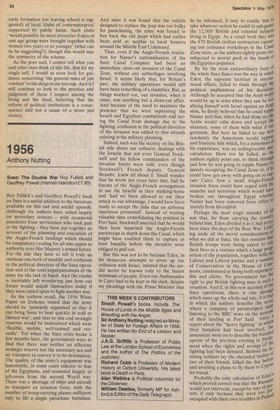Bumblebeedom
J.A.G. Griffith
rLaw, Legislation and Liberty Vol. 3: The „rolifical Order of a Free People F. A. maYek (Routledge £5.95).
Professor Hayek is disturbed by the failure of political institutions to produce a just society. Essentially the argument in this short and rePetitious essay concerns the 'progressive disillusionment about elected assemblies having 'unlimited power'. Their members are necessarily engaged in a bargaining Process in which they seek to bribe a sufficient number of voters to support one or her organised group. The majority group then has coercive power over all of us. So Pvernments become omnipotent whereas In truth 'only limited government can be decent government.'. The distinction to be Made is between the needs of 'government' and the needs of 'legislation', the latter b„eing not the sort of thing with which the 'louse of Commons usually concerns itself but the making of 'universally applicable rules of just conduct'. Assemblies concerned with day-to-day 'governmental' Matters are unsuited for this purpose. ti•The argument is familiar, being part of .ue stock-in-trade of conservative apologists like Lord Hailsham, Bill-of-Rights liberals like Lord Scarman, and natural law litltrisprudists like Professors Dworking and awls. It goes along with newly written `onstitutions and supreme courts, with 111,. ore powerful second chambers, some ea with devolution. This theory of limited Pvernment seems to have been inspired, in its Most recent manifestation, by the ability et governments to legislate with very small iiiiialorities, a state of affairs which, Lord H. ,,as said, we must ensure 'at almost any cost' u°es not happen again. c A.PPlied to Great Britain this is a very urious analysis. Governments in recent Years, Conservative and Labour, have rely not been distinguished for the mighty 17Ings they have done. Messrs Wilson, "eath and Callaghan have not obviously PUt the fear of Whitehall into big business or the trade unions. Labourism is very far from socialist regulation. And Conservatism under Mistress Thatcher is unlikely to allow even its monetarists more than a moderate opportunity for positive restrictionism.
To be fair, Hayek is no minimalist when considering the proper range of governmental functions. He believes that government ought to use its power of raising funds by taxation to provide a number of services which for various reasons cannot be provided, or cannot be provided adequately, by the market. So did Adam Smith and his heirs believe. No doubt those who most rely on public services fare marginally less well under Conservative than under Labour governments. But in recent years the margin has become smaller and smaller and this again is because, for all the familiar reasons, recent governments have been unable, or have lacked the will, to enlarge their functions. Our modern political Princes do not display over-weening power.
But all this is not Hayek's main concern. What he wants is an institution, a structural reform, which will enable society to be guided by those who will elaborate a basic clause in his new constitution which will state that 'in normal times, and apart from certain clearly defined emergency situations, men could be restrained from doing what they wished, or coerced to do particular things, only in accordance with the recognised rules of just conduct designed to define and protect the individual domain of each'.
At this point, Hayek seems to lose his presence of mind. His solution is informed by such mild and amiable lunacy that, as a hoax designed to show what happens when planners construct models, it would be modestly satirical. But, alas, it is meant seriously.
The proposal is that in addition to the representative assembly as we know it there should be a second body to be called the Legislative Assembly entrusted with the task of stating the general rules of just conduct. Its members are to be men and women elected at the age of 45 years (neither older nor younger) who will then serve for 15 years without the tedium of submitting to re-election. They must be persons who have already 'made their reputation in the ordinary pursuits of life'. On retirement they would be assured of 'continued public employment in honorific but neutral positions as lay judges'. One fifteenth of the Assembly would be elected each year. Members would be removable only for gross misconduct or neglect of duty. They could be paid at a certain percentage of the average of the 20 most highly paid posts in the gift of government.
All that is silly enough; but who is to compose the electorate? The answer you will not believe. Votes will be cast annually by those who are in the 45th year of their life (neither older nor younger). Like bumble-bees they will sting once and die. The consciousness of this future duty to vote on one occasion 'might well lead' to the early formation (on leaving school is suggested) of local 'clubs of contemporaries' supported by public funds. Such clubs 'would possibly be more attractive if men of one age group were brought together with women two years or so younger' (what can he be suggesting?), though this would mar the symmetry of the scheme.
As the poet said, I cannot tell what you and other men think of this life. But for my single self, I would as soon look for guidance concerning 'the general rules of just conduct' to the dregs in my tea-cup. As it is I will continue to look to the practice and judgment of those I respect among the living and the dead, believing that the reform of political institutions is a consequence and not a cause of a more just society.











































 Previous page
Previous page